One of the most common queries on Google about dogs is what dogs can eat. The question in the title, can dogs eat hummus, is just one example (the answer is that it depends, read on to find out in what way!).
Dog owners ask about almost all kinds of food, or rather edible stuff. To be honest I sometimes wonder WHY? Why do you need to know if your dog can eat donuts or jelly beans? Are you seriously considering feeding your dog that? You do know it’s not good for you as a human, so why would you want to give it to your dog?
On the other hand, it’s a good thing that you care about your dog’s health and want to make sure she won’t be harmed by what you’re about to feed her.
It would take a gigantic article to cover all the queries about what you can treat your dog with and not risk their health, so I’ve had to be picky.
I’ve chosen common questions but also some of the more poisonous foods even though they’re not asked about that often.
Quick Navigation
Can Dog’s Eat…
#1: …Hummus?
Of course we’ll start with the title question! I did after all leave you in suspense with that one, saying it depends. In what way?
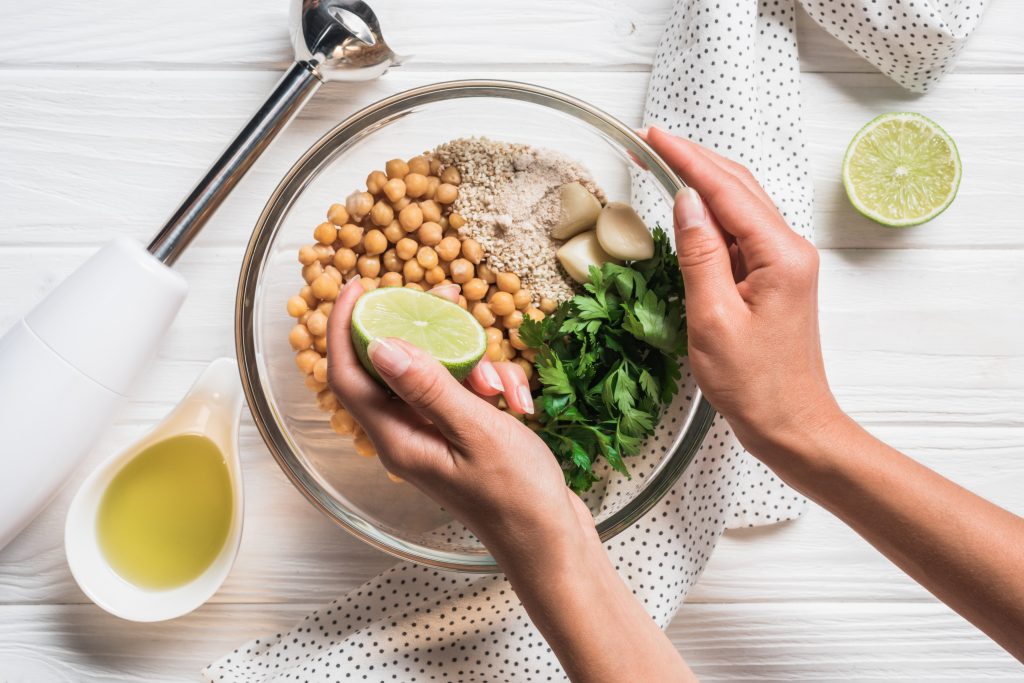
The main ingredient in hummus is chickpeas. These are just fine for your pooch to eat. In fact, they are an ingredient in many dog foods. Poorly cooked they might cause some flatulence or loose poop, but they are not toxic.
Another common ingredient is tahini. This is a paste made from sesame seeds. Again, no worries for your dog to eat.
But then we have garlic. I’d go as far as saying it’s hard to consider making hummus without it. And this is where we come to a full stop.
Garlic is toxic to dogs, as well as all other kinds of onions. It contains the substance thiosulfate, which damage the red blood cells in dogs, but not so in humans.
Olive oil is fine, although all kinds of fats in great quantities can cause diarrhea. In the long run also canine pancreatitis, especially if your dog is overweight, not that active and not that young.
It’s also common to use lemon juice in hummus. A few drops won’t bother your dog, but more than that may disturb the production of gastric acids and cause great discomfort.
Parsley, commonly sprinkled on top of the hummus bowl, is absolutely fine for your dog to eat. Only exceptions are if your dog is pregnant or have kidney troubles.
To summarize, if you make your own hummus completely without garlic, it’s fine for your dog to have a taste. But if you buy readymade or put garlic in your homemade, keep it out of reach of your furry family member!
#2: …Grapes And Raisins?
You do know that raisins are simply dried grapes right? So I will consider these as one question.
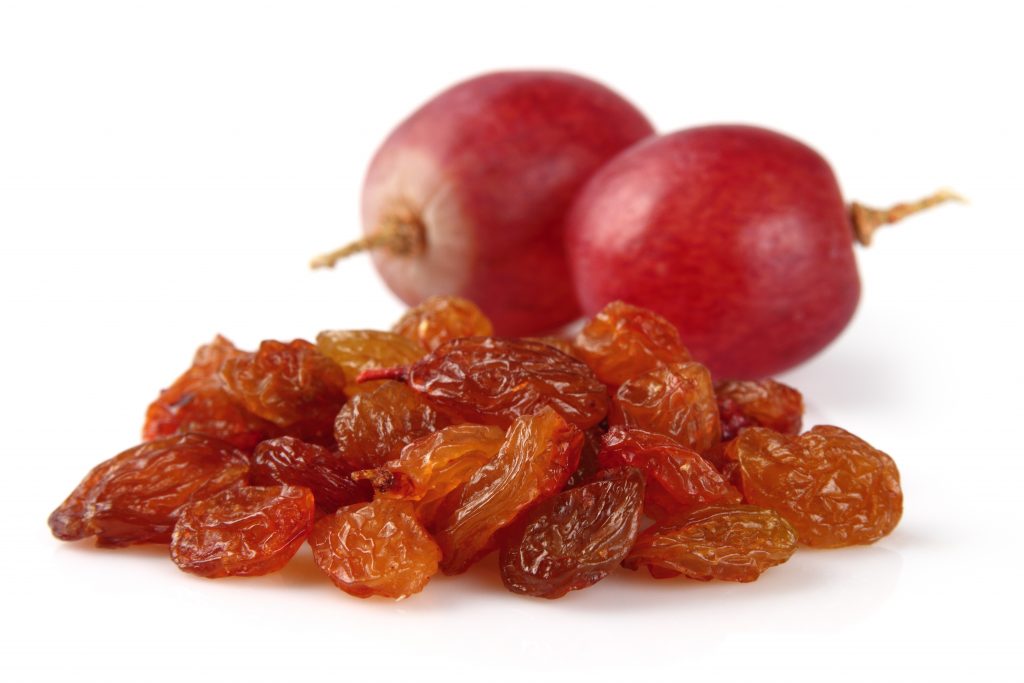
The answer is NO. Grapes and raisins can cause acute kidney failure in dogs. There are no known minimum volumes causing this, and the reason for the toxicity is not known. Also, all dogs do not react, and it’s impossible to tell which dog will.
As little as 0.036 oz of raisins per pound body weight can be enough to make your dog sick. And it can be really bad. The death-rate from grape or raisin poisoning is high, even when the dog is treated.
The early signs are vomiting, sometimes in combination with diarrhea. Later on, usually after a few days but sometimes earlier, the dog gets stomach pain (tender) and starts to sway.
The treatment can demand weeks of intense surveillance and IV fluids, and does far too often not end well.
So the bottom line is, never ever give a dog anything that may contain grapes or raisins! And should it still happen, rush to the vet as fast as you possibly can, as it can mean the difference between life or death to your pooch.
#3: …Ibuprofen Like Advil?
No. Never give your dog painkillers from your medicine cabinet. (Or any other human medicine for that matter.)
Strictly speaking, ibuprofen is not a foodstuff of course, but considering how poisonous it is to dogs I wanted to include it here anyway.
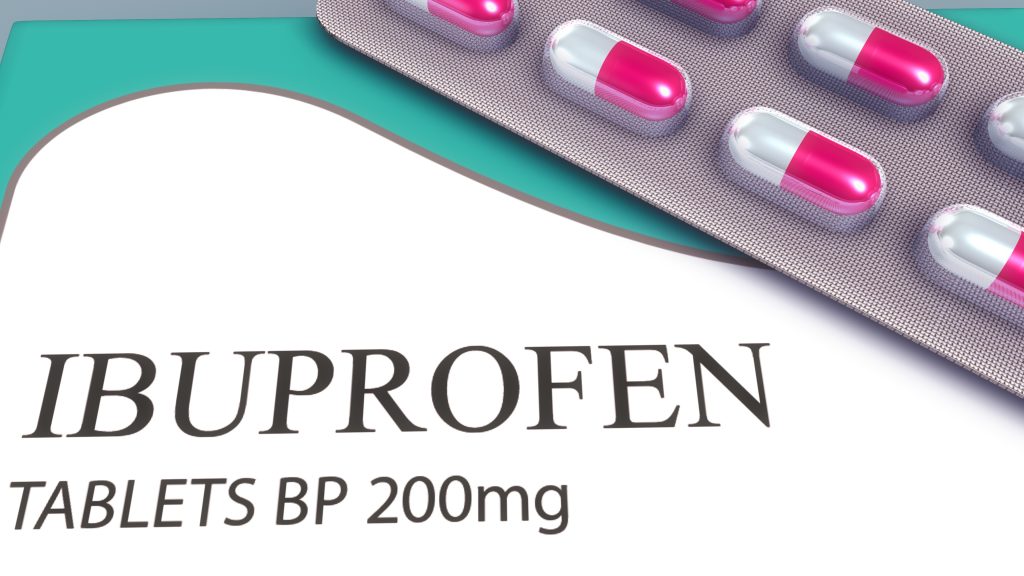
The painkiller substance ibuprofen can indeed be prescribed by a veterinarian as an anti-inflammatory. But, it can cause poisoning and be very harmful to your dog if you give her the stuff intended for humans.
There are veterinary variants that are much safer but that can also be toxic in too large amounts.
So what are the symptoms to look for?
- Vomiting and/or diarrhea
- Won’t eat
- Blood in vomit and stool (gets dark)
- Pale gums (caused by blood loss)
The really scary part of ibuprofen poisoning is that it can cause ulcers and actually perforation of the stomach and intestines.
Kidney failure is another possible and gruesome consequence.
Time is essential. If you suspect that your dog has eaten an Advil or some other brand of ibuprofen, instantly take her to the vet’s! She needs to have her stomach emptied as soon as possible.
#4: …Egg Whites?
Absolutely! Eggs are a valuable protein and fat source, and they are packed with vitamins as well.
The reason for this fairly common query online is probably this: Raw egg whites naturally contain the protein avidin. A high intake of this protein may inhibit the function of vitamin B7, also called biotin. B7 is necessary for the synthesis of fatty acids, among other vital processes in the body.
Remember though that this demands an excess intake, an egg a day is no problem. And if you boil the egg the avidin is destroyed and there is no risk of blocking the biotin.
Still, feeding your dog one egg a day is plenty, eggs are only a small part of a wild dog’s or wolf’s natural diet.
#5: …Nuts?
Some nuts yes, but others no.
So which ones are safe? And how many?
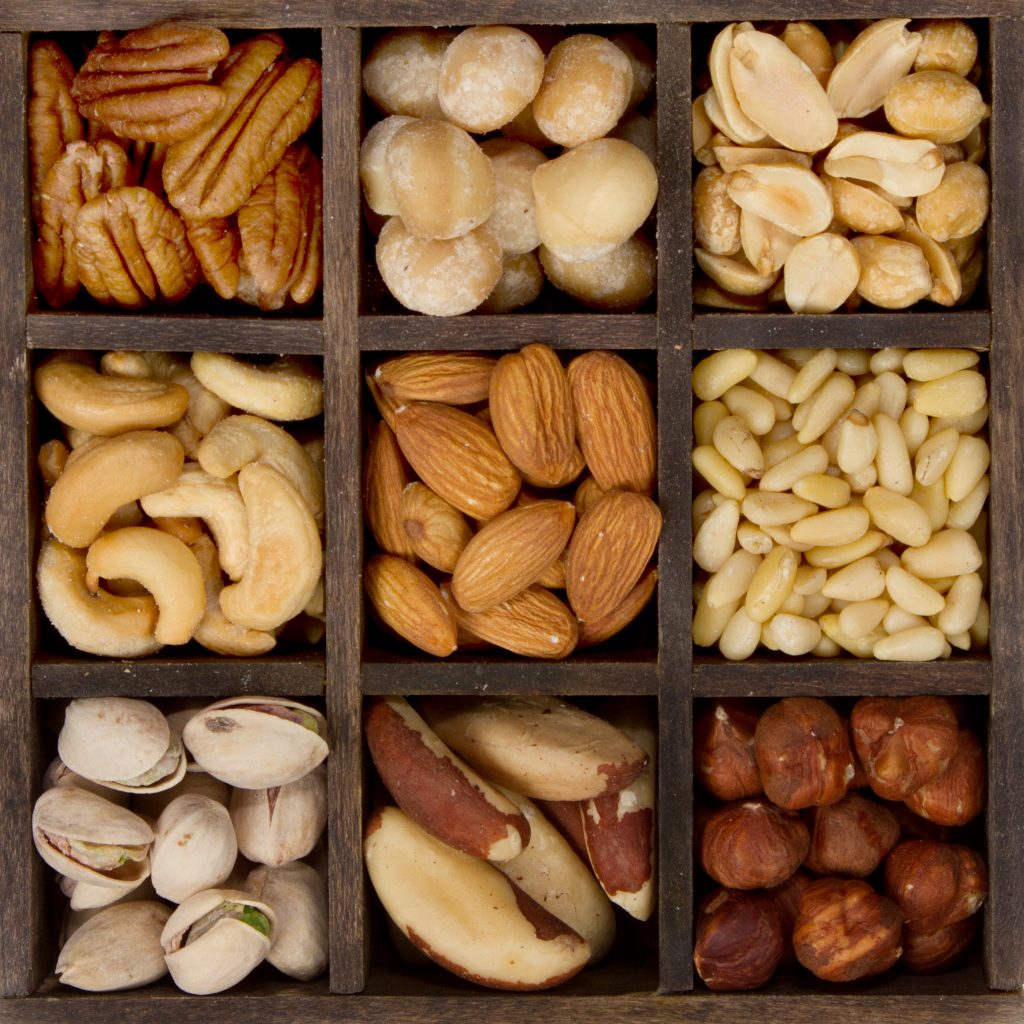
Macadamia Nuts – No!
The one nut to specifically avoid is macadamia. Macadamia nuts are toxic to dogs.
Symptoms are weakness, vomiting, tremors, lethargy and hyperthermia. (Hyperthermia is not the same thing as fever. Fever is caused by an infection in the body, hyperthermia is when the body temperature rises for other reasons.)
Usually the dog recovers without treatment. Do you suspect or know that your dog has eaten quite a few macadamias it’s always a good idea to call your vet and ask for advice.
Other nuts
Other nuts are fine, except for black walnuts. They can cause vomiting and in some cases neurological symptoms.
Three words of warning though concerning giving nuts to your pooch:
- They are a choking hazard. Small, hard, edgy or round, they get wedged just fine in the throat while at the same time causing irritation
so the throat starts to swell. Chop up the nuts before treating them to your dog! - Nuts contain lots of fat. Fat in itself is not bad but essential, but too much can make your dog obese and also cause diarrhea.
- Snack nuts are often heavily salted, please don’t give those to your dog. It’s not good for her to eat that much salt.
To summarize: It’s fine to give your dog a few natural nuts once in a while (but not macadamia and black walnuts). On the other hand, an even better alternative is perhaps to skip the nuts altogether.
#6: …Dried Mango?
Sure she can!
Mango is full of vitamins and soluble fibers, those that feed the good bacteria in the gut.
The vitamins are A, B6, C, and E.
But, the sugar content in dried mango is quite high, as well as the fiber content. Because of this you should only feed your pooch a piece or two occasionally.
More or more often than that can cause an upset stomach.
Of course, fresh mango is also fine. Make sure to remove the skin and the pit. The skin is edible but hard to digest, and the seeds in the pit contans cyanide. The pit can also be a choking hazard or get stuck in the digestive tract.
As with all fruit and vegetables, they are not a natural part of a canines diet. With this in mind, a piece now and then is ok.
#7: …Avocado?
I’m sure you have heard that avocado is toxic for dogs and that they cannot eat it. But is it, and can’t they?
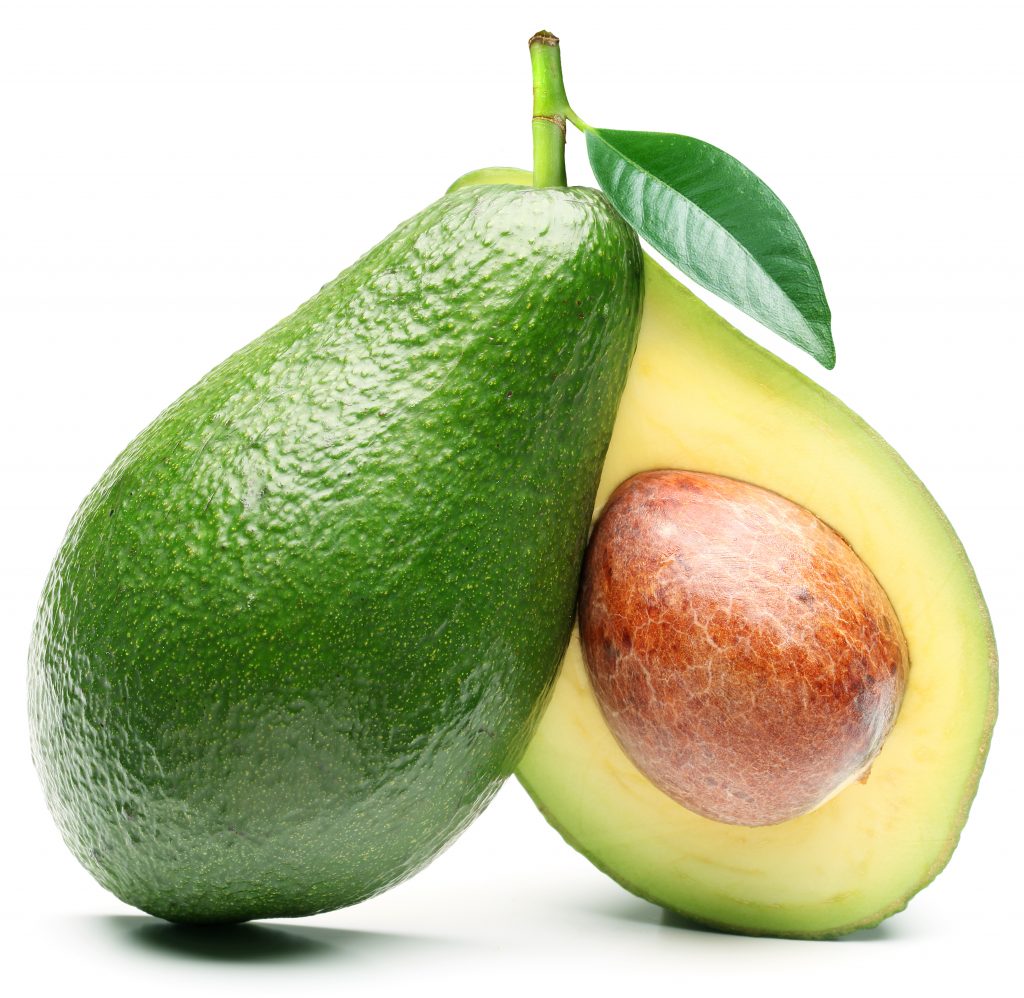
As it turns out, it’s not and they can. But what about the rumor that says the opposite? Is there no truth at all in that?
Persin is a fat-soluble toxin that is present in most parts of the avocado. Horses, cattle, birds and many other domesticated animals are sensitive to it.
However, persin is not toxic to dogs. There is even dog food using avocado in their recipe. Hardly a good idea if avocado was toxic to dogs.
But make sure your pooch does not get hold of the avocado pit. Risk is that the golf ball-sized seed gets stuck in the throat or the intestines, causing an obstruction. This is very dangerous and could in a worst case scenario kill your dog.
So even though it’s fine to once in a while put some avocado fruit in your dog’s dinner, make sure you keep the whole avocado out of reach for your dog.
#8: …Almond And Nut Butters?
We did cover nuts above, but since so many ask about almond butter and other nut butters I will talk about that specifically.
Of course, what is said above about nuts is also true about the butters. That means almond butter is fine.
Macadamia butter and walnut butter are no-nos.
Peanut butter is fine too.
As with the nuts themselves, remember that the butters are high in fat and can cause some turmoil in your dog’s tummy (read diarrhea) if served too generously.
But, there is a special case when all nut butters turn into a very dangerous choice for your pooch.
This is when the butter has been sweetened with xylitol. This substance is highly toxic to dogs.
It causes a rapid drop in the dog’s blood sugar levels, also known as hypoglycemia. Studies have also shown that xylitol can cause acute liver failure and coagulopathy. The latter means the blood doesn’t coagulate the way it needs to. This may cause bleedings in the inner organs.
What foods contain xylitol?
Xylitol is used in many other products apart from nut
- Sugar-free candy and chocolate
- Chewing gum (as little as one piece can be toxic!)
- Fruit drinks
- Jello and pudding mixes
- Jams and syrups
- Flavored water
- Toothpaste and mouth wash
- Cookies and ice-cream
- Protein bars and powders
- Sauces and condiments
- Deodorants and lotions
Choose only plain and completely unsweetened almond and nut
#9: …Chocolate?
My little Nelly (Yorkshire Terrier) once ate half of a 3.5 oz bar of chocolate with 60% cocoa content. After consulting the vet on the phone we rushed to the clinic and Nelly was injected with
We now keep our chocolate in a kitchen cabinet, not on the table!
Of course, if your dog eats a tiny piece of milk chocolate you don’t need to rush to the
PetMD has a simple Chocolate Toxicity Meter on their site. You enter your dog’s weight, how much chocolate she ate and what type. I didn’t know about it when Nelly ate the chocolate, but when I entered the details from that occasion the meter showed Emergency!
#10: …Donuts And Oreos? (And Other Cookies And Pastry)
The answer to this depends on what you mean by ‘can’ eat. As long as the cookie does not contain xylitol, chocolate or raisins, a dog CAN eat it.
On the other hand, a dog will not benefit in any way at all from eating it. It will only do harm in the
A donut or a cookie is just as bad for a dog as it is for a human. But a dog can’t make a conscious choice, it can’t understand that eating an Oreo every day will make it sick in the long run. It’s completely dependent on the food choices you make.
So my personal answer to the heading above is NO. A dog can not eat donuts or Oreos.
Please, please don’t give it to your dog!
Some Other Things Dogs Shouldn’t Eat
Dough: The dough will produce alcohol when it ferments in the stomach, and make your dog intoxicated (see below). It also increases in volume causing bloating. If things turn out really bad the stomach might twist, this is a life-threatening condition and must be taken care of immediately.
Alcohol: Now who would give their dog alcohol? Unfortunately, some people think it’s fun to give their dog a beer on Friday night. To me, this is nothing but animal cruelty. A dog is very sensitive to alcohol intoxication, and might even die from it. Signs are disorientation, high body temperature, restlessness, excessive panting, vomiting, trembling, and seizures. If your dog has been given anything with alcohol in it and displays any of these signs, take her to the vet immediately. Her internal organs may be in danger of closing down.
Acorns: Acorns contain the substance tannin which is corrosive. A large enough dose (5-10 acorns for a 20-pound dog) may cause kidney and liver damage. Symptoms are lethargy, loss of appetite, tar-like stools, fever,
Dairy: Dogs do not have the enzyme lactase in their gastric juices, and cannot process lactose in dairy products. This might cause diarrhea and stomach pains.
Please note: The information provided in this article is in no way a substitute for professional veterinary advice or help.
Do you have a question about something you’re not sure if your dog can eat? Ask in the comments below and I’ll do my best to help you out!
Remember though, if your dog has already eaten something you’re not sure about, please contact your veterinary immediately and ask!

